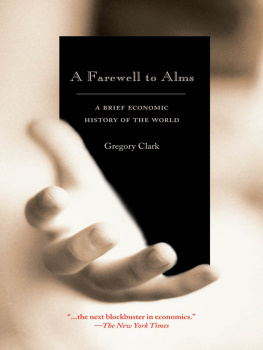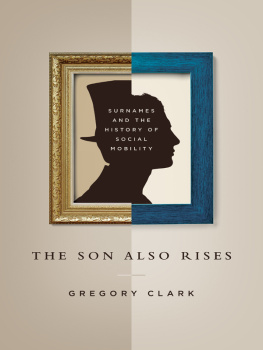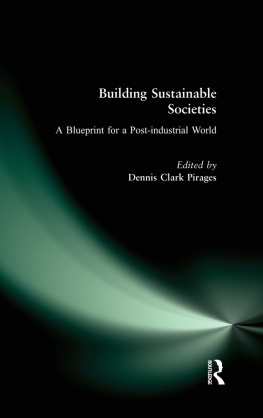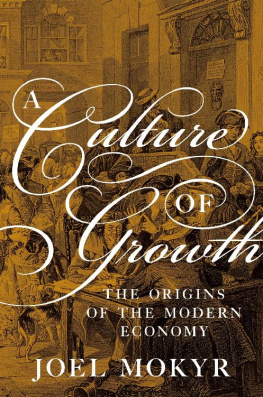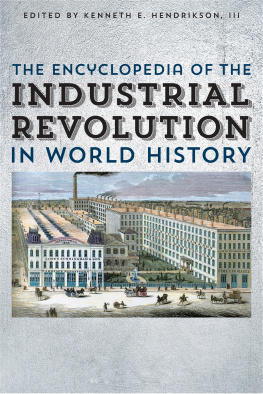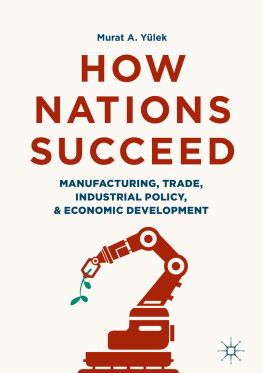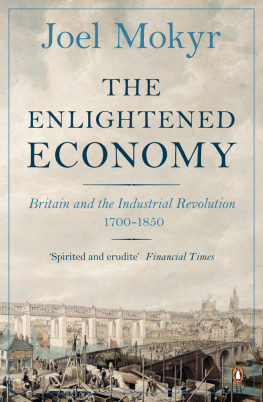A Farewell to Alms
THE PRINCETON ECONOMIC HISTORY OF THE WESTERN WORLD
Joel Mokyr, Editor
Growth in a Traditional Society: The French Countryside,14501815, by Philip T. Hoffman
The Vanishing Irish: Households, Migration, and the Rural Economy in Ireland,18501914, by Timothy W. Guinnane
Black47and Beyond: The Great Irish Famine in History, Economy, and Memory, by Cormac Grda
The Great Divergence: China, Europe, and the Making of the Modern World Economy, by Kenneth Pomeranz
The Big Problem of Small Change, by Thomas J. Sargent and Franois R. Velde
Farm to Factory: A Reinterpretation of the Soviet Industrial Revolution, by Robert C. Allen
Quarter Notes and Bank Notes: The Economics of Music Composition in theEighteenth and Nineteenth Centuries, by F. M. Scherer
The Strictures of Inheritance: The Dutch Economy in the Nineteenth Century, by Jan Luiten van Zanden and Arthur van Riel
Understanding the Process of Economic Change, by Douglass C. North
Feeding the World: An Economic History of World Agriculture,18002000, by Giovanni Federico
Cultures Merging: A Historical and Economic Critique of Culture, by Eric L. Jones
The European Economy since1945: Coordinated Capitalism and Beyond, by Barry Eichengreen
War, Wine, and Taxes: The Political Economy of Anglo-French Trade,16891900, by John V. C. Nye
A Farewell to Alms: A Brief Economic History of the World, by Gregory Clark
A Farewell to Alms
A BRIEF ECONOMIC HISTORY OF THE WORLD
Gregory Clark
PRINCETON UNIVERSITY PRESS
Princeton and Oxford
Copyright 2007 by Princeton University Press
Published by Princeton University Press, 41 William Street, Princeton, New Jersey 08540
In the United Kingdom: Princeton University Press, 3 Market Place, Woodstock, Oxfordshire OX20 1SY
All Rights Reserved
Library of Congress Cataloging-in-Publication Data
Clark, Gregory, 1957
A farewell to alms : a brief economic history of the world / Gregory Clark.
p.cm. (The Princeton economic history of the Western world)
Includes bibliographical references and index.
ISBN: 978-1-40082-781-7
1 . Economic history. I. Title.
HC21.C63 2007
330.9dc 222007015166
British Library Cataloging-in-Publication Data is available
This book has been composed in Adobe Garamond by Princeton Editorial Associates, Inc., Scottsdale, Arizona
Printed on acid-free paper.
press.princeton.edu
Printed in the United States of America
10 9 8 7 6 5 4 3 2 1
To Mary, Maximilian, Madeline, and Innis
Contents
Preface
This book takes a bold approach to history. It discerns, within a welter of often sketchy and sometimes conflicting empirical evidence, simple structures that describe mankinds long historystructures that can accommodate the startling facts about human history and the present world detailed in these pages. It is an unabashed attempt at big history, in the tradition of The Wealthof Nations, Das Kapital, The Rise of the Western World, and most recently Guns,Germs, and Steel. All these books, like this one, ask: How did we get here? Why did it take so long? Why are some rich and some poor? Where are we headed?
Intellectual curiosity alone makes these compelling questions. But while the book is focused on history, it also speaks to modern economic policy. For the text details how economists, and the institutions they inhabit, such as the World Bank and the International Monetary Fund, have adopted a false picture of preindustrial societies, and of the eventual causes of modern growth. These fanciful notions underlie current policies to cure the ills of the poor countries of the world, such as those represented by the Washington Consensus.
Though the book is about economics, we shall see that in the long run economic institutions, psychology, culture, politics, and sociology are deeply interwoven. Our very natureour desires, our aspirations, our interactionswas shaped by past economic institutions, and it now in turn shapes modern economic systems. This book thus also has much to offer readers interested in anthropology and political, social, and even cultural history.
Fortunately for the reader, a simple set of ideas can carry us a long way in explaining the evolution of the world economy through the millennia. No formal economics training is necessary to understand any of what follows. Thusthough the issues grappled with here are ones that remain on the agendas of the most technically oriented economiststhey are issues that readers innocent of the elaborate theoretical apparatus can fully appreciate.
Doubtless some of the arguments developed here will prove over-simplified, or merely false. They are certainly controversial, even among my colleagues in economic history. But far better such error than the usual dreary academic sins, which now seem to define so much writing in the humanities, of willful obfuscation and jargon-laden vacuity. As Darwin himself noted, false views, if supported by some evidence, do little harm, for every one takes a salutary pleasure in proving their falseness: and when this is done, one path towards error is closed and the road to truth is often at the same time opened. Thus my hope is that, even if the book is wrong in parts, it will be clearly and productively wrong, leading us toward the light.
Underlying the book is a wealth of data I have assembled on the history of the English economy between 1200 and 1870. To make the book easier on the reader, figures and tables that rely on this data set are not individually referenced. Where a source is not indicated for a figure or a table, or for a portion of a figure or a table, the underlying data and its sources will be found in Clark (2007b).
This book is the product of twenty years of labor in a particularly obscure corner of the academic vineyard: quantitative economic history. I am fortunate that the economics and history professions both so lightly regard these vines that a single scholar can claim whole centuries as his personal garden, and tend it reflectively and unmolested. But I hope that the book will also interest professional economists and historians, and remind them that a constant diet of Gallo can dull the palate.
. Darwin, 1998, 629.
Acknowledgments
In writing this book I have accumulated a list of debts that is Trumpian in scale. The first is to those who commented on the manuscript or related papers, saving me from countless embarrassments and suggesting important revisions: Cliff Bekar, Steven Broadberry, Bruce Charlton, Anthony Clark, Alexander Field, James Fulford, Regina Grafe, Eric Jones, Oscar Jorda, Madeline McComb, Mary McComb, Tom Mayer, Joel Mokyr, Jim Oeppen, Cormac Grda, Kevin ORourke, James Robinson, Kevin Salyer, James Simpson, Jeffrey Williamson, and Susan Wolcott. I owe a special debt to my editorsJoel Mokyr, the series editor for the Princeton Economic History of the Western World, and Peter Dougherty of Princeton University Pressfor their patience and wise counsel in the face of significant provocation. Peter Strupp of Princeton Editorial Associates copyedited the manuscript with astonishing attention to both detail and content.
My second debt is to my colleagues at the University of California, Davis. The economics department here is an astonishingly lively and collegial place. Alan Olmstead made Davis a center for economic history. His leadership of the All-UC Group in Economic History helped make California the world center of economic history. Peter Lindert has ageless enthusiasm, energy, and generosity. Alan Taylor threatens to transform this neglected corner of the vineyard into a grand cru. My colleagues in economicsespecially Paul Bergin, Colin Cameron, Kevin Hoover, Hilary Hoynes, Oscar Jorda, Chris Knittel, Doug Miller, Marianne Page, Giovanni Peri, Kadee Russ, Kevin Salyer, Ann Stevens, and Deborah Swensonmade every day fun, stimulating, and entertaining.

